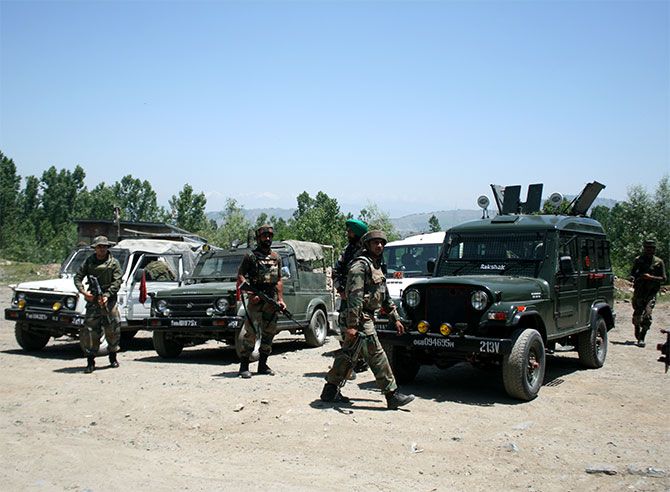'There is a clear plan being followed by the Indian government.'
'With these attacks, we are trying to dispel the myth that the Pakistani army can cause problems.'

Last month the Indian Army honoured Major Nitin Leetul Gogoi with a 'Commendation Card' for his 'sustained efforts' in counter-insurgency operations in Jammu and Kashmir.
The recognition comes barely a month after he tied a supposed stone-pelter to his jeep, using him as a human shield to prevent violent protesters from attacking his vehicle.
Major Gogoi was responding to a call from an officer who had informed him that around 1,200 people had cornered his polling booth and were trying to burn it with petrol bombs during a by-election in Budgam on April 9.
Defence and strategic affairs expert Maroof Raza -- a former military officer himself -- speaks to Dhruv Munjal about the army's decision to award Major Gogoi amid a public outcry, and if the force has let itself down with the handling of this situation.
How do you view the Indian Army's decision to felicitate Major Gogoi with the chief of army staff's 'Commendation Card'? An inquiry into the incident is still on.
It hasn't been often in recent memory that the army has formally encouraged an officer to take such a step.
Mostly, senior generals have been cautious while taking on the political establishment.
This is a drastic change and I see it as a good one.
As far as the timing of the award is concerned, yes, the inquiry is underway, but I'm sure the broad contours of the inquiry findings must have been conveyed to General Bipin Rawat, the chief of army staff. Perhaps, that is why they went ahead with the announcement of the award.
There are many who feel there was a clear violation of human rights in this whole episode.
Those posing such concerns should question the pretext of human rights.
The soldiers were cornered and there were several lives at stake; this was clearly an act of self defence.
And those raising worries about human rights should come out and offer alternative solutions to what Major Gogoi could have possibly done.
Keeping the situation and the sensitivity of the place in mind, the right thing was done.
Moreover, no one is bothered about the human rights of the soldier, or the difficulties he endures.
In the US, cases of conflict trauma have been found in more than 50 per cent of the personnel returning from Iraq and Afghanistan.
Indian soldiers go through something similar.
Others believe that the army has let itself down in the handling of the 'human shield' incident, and also lost the moral upper hand that it always held in Kashmir.
No one -- the Kashmiri politicians in particular -- has the right to question the morality of the Indian Army.
These politicians are ungrateful people who have never supported the army in anything it has done.
If they feel that the army showed restraint all these years, did they acknowledge its efforts even once?
You never hear them saying a word against Pakistan, either.
More importantly, people blaming the army for this 'moral' letdown have an extremely superficial understanding of conflict.
Most of them have very little idea about national security.
If the army has indeed held the moral high ground in Kashmir for the past so many decades, then that hasn't really solved the problems that afflict the state.
Defence Minister Arun Jaitley has stated that Indian forces must be allowed to take calls in war-like zones such as Kashmir, and not be dictated by what politicians say. Isn't that dangerous?
There was much need for what the defence minister has said.
What the army needs is clear instructions in such precarious areas and that cannot come from politicians.
Also, this will help boost the morale of the troops stationed in Kashmir, and offer great encouragement.
The Indian Army released footage of it destroying Pakistani bunkers in Nowshera along the Line of Control. Are such publicised assaults the new normal now?
There is a clear plan being followed by the Indian government.
It wants to take on Pakistan by going public with all the information and evidence it possesses, which is the right way forward.
This also shows that the Indian Army has been given a free hand.
And the people who are questioning the government and the army for publicised attacks had a problem when no evidence was released for the surgical strikes conducted against Pakistan last year.
I'm certain that video evidence of that assault exists as well, but is being held back for strategic reasons.
With these attacks, we are trying to dispel the myth that the Pakistani army can actually cause some problems.
They are, in fact, quite inept.
IMAGE: Soldiers cordon off the area where terrorists attacked an army convoy at Qazigund, south Kashmir, June 3. Photograph: Umar Ganie for Rediff.com











